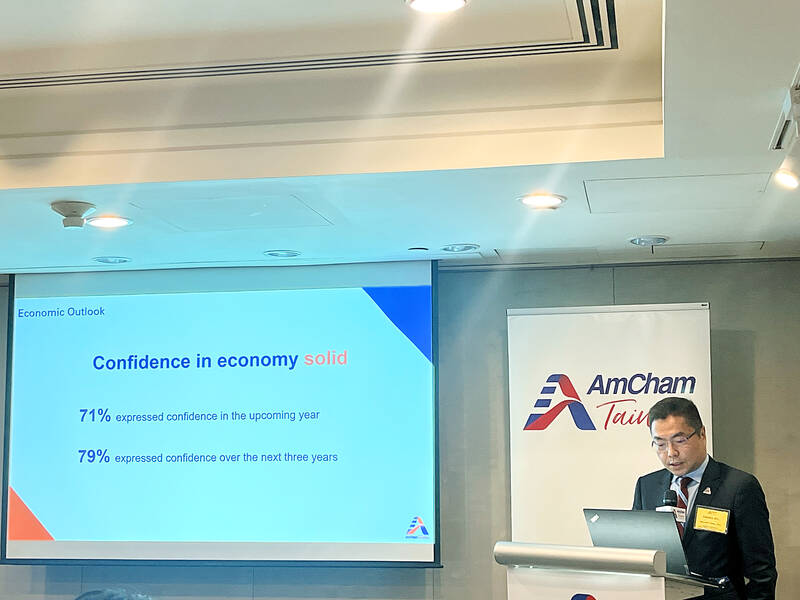Most US companies in Taiwan are optimistic about revenue growth this year and beyond, but a sizeable number said Taiwan’s regulatory environment has grown increasingly unfriendly, a survey by the American Chamber of Commerce (AmCham) released yesterday showed.
Nearly three-quarters, or 73 percent, are positive about revenue pickup in the coming year, but satisfaction with the regulatory environment declined, the foreign trade group said.
About 43 percent of respondents said that Taiwanese laws and regulations have not been updated in response to changing societal and economic needs, and their implementation is inconsistent, it said, adding that 34 percent identified regulations and policies as the most important area for improvement.

Photo: Hsu Tzu-ling, Taipei Times
The survey, conducted from Nov. 15 to Dec. 16 last year, also showed that 56 percent support net zero emissions or 100 percent renewable energy usage, but 67 percent expressed concern over the availability of green energy.
Energy sufficiency should be a top priority for the government in the next one to three years, 42 percent of respondents said.
Failure to secure sufficient green energy supply would constrain inbound foreign investment at a time when risk assessments have already added a premium for foreign investors, AmCham said.
Regardless, a big majority of respondents remain committed to Taiwan, with 88 percent indicating plans to maintain or boost their investment, the survey showed.
As high as 85 percent expressed confidence over Taiwan’s economic showing in the next three years, although expectations have been adjusted due to global economic headwinds, it showed.
Human capital remains a focus among member companies, with 60 percent seeking to invest in staff expansion and development this year and many calling on the government to prioritize this issue in the coming years, it said.
In addition, 73 percent support the government pursuing a bilateral trade agreement with the US, Taiwan’s second-largest trading partner, it said.
Since sound regulatory practices are a focus area of US-Taiwan trade, policymakers should consider the chamber’s constructive criticism and strive to establish a more investment-friendly regulatory environment, the trade group said.
While many consider national security and cross-strait relations significant issues, 67 percent of respondents reported no significant disruptions due to heightened tensions across the Taiwan Strait following China’s large-scale military exercises after a visit by then-US House of Representatives speaker Nancy Pelosi in August, it said.
Nevertheless, 47 percent of companies have revised or plan to revise business continuity plans in Taiwan to address the new geopolitical condition, it said.

Taiwan is projected to lose a working-age population of about 6.67 million people in two waves of retirement in the coming years, as the nation confronts accelerating demographic decline and a shortage of younger workers to take their place, the Ministry of the Interior said. Taiwan experienced its largest baby boom between 1958 and 1966, when the population grew by 3.78 million, followed by a second surge of 2.89 million between 1976 and 1982, ministry data showed. In 2023, the first of those baby boom generations — those born in the late 1950s and early 1960s — began to enter retirement, triggering

ECONOMIC BOOST: Should the more than 23 million people eligible for the NT$10,000 handouts spend them the same way as in 2023, GDP could rise 0.5 percent, an official said Universal cash handouts of NT$10,000 (US$330) are to be disbursed late next month at the earliest — including to permanent residents and foreign residents married to Taiwanese — pending legislative approval, the Ministry of Finance said yesterday. The Executive Yuan yesterday approved the Special Act for Strengthening Economic, Social and National Security Resilience in Response to International Circumstances (因應國際情勢強化經濟社會及民生國安韌性特別條例). The NT$550 billion special budget includes NT$236 billion for the cash handouts, plus an additional NT$20 billion set aside as reserve funds, expected to be used to support industries. Handouts might begin one month after the bill is promulgated and would be completed within

NO CHANGE: The TRA makes clear that the US does not consider the status of Taiwan to have been determined by WWII-era documents, a former AIT deputy director said The American Institute in Taiwan’s (AIT) comments that World War-II era documents do not determine Taiwan’s political status accurately conveyed the US’ stance, the US Department of State said. An AIT spokesperson on Saturday said that a Chinese official mischaracterized World War II-era documents as stating that Taiwan was ceded to the China. The remarks from the US’ de facto embassy in Taiwan drew criticism from the Ma Ying-jeou Foundation, whose director said the comments put Taiwan in danger. The Chinese-language United Daily News yesterday reported that a US State Department spokesperson confirmed the AIT’s position. They added that the US would continue to

The National Development Council (NDC) yesterday unveiled details of new regulations that ease restrictions on foreigners working or living in Taiwan, as part of a bid to attract skilled workers from abroad. The regulations, which could go into effect in the first quarter of next year, stem from amendments to the Act for the Recruitment and Employment of Foreign Professionals (外國專業人才延攬及僱用法) passed by lawmakers on Aug. 29. Students categorized as “overseas compatriots” would be allowed to stay and work in Taiwan in the two years after their graduation without obtaining additional permits, doing away with the evaluation process that is currently required,